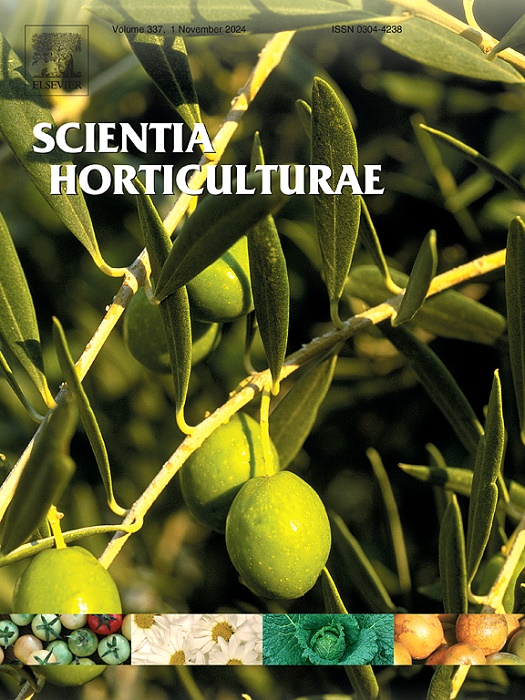外源应用乙酰托因促进番茄幼苗生长并改变转录组谱
IF 4.2
2区 农林科学
Q1 HORTICULTURE
引用次数: 0
摘要
微生物衍生的挥发性有机化合物可以影响植物生长并增强系统抗性;然而,各自的转录变化尚不清楚。本研究的重点是乙托因,一种特定的挥发性有机化合物,以评估其在不同浓度下对番茄幼苗生长的影响。在一个水培实验中,在0.5 g L -乙托因的浓度下观察到最佳的生长,这也促进了幼苗光合活性的增加。6 h时,分别在叶片、茎和根中鉴定出796个、62个和114个差异表达基因(deg)。24小时后,数量分别显著增加到517个、450个和3981个,主要包括上调的deg。利用京都基因和基因组百科数据库对这些基因进行了注释,发现与植物激素信号转导和植物与病原体相互作用相关的途径中有显著的富集。与应激反应和生长素生物合成相关的基因的显著上调可能有助于提高植物的生长和应激恢复能力。生理评价表明,乙托因处理显著提高了番茄叶片中吲哚-3-乙酸、脱落酸、茉莉酸、糖基化水杨酸和反式玉米素的水平,最终促进了幼苗的生长。这些结果为抗逆性作物的选育提供了潜在的分子靶点,并突出了乙托因作为微生物肥料的应用前景。本文章由计算机程序翻译,如有差异,请以英文原文为准。
Exogenous application of acetoin promotes tomato seedling growth and alters the transcriptome profile
Microbially derived volatile organic compounds can influence plant growth and bolster systemic resistance; however, the respective transcriptional changes are unclear. This study focused on acetoin, a specific volatile organic compound, to assess its impact on the growth of tomato seedlings across various concentrations. In a hydroponic experiment, optimal growth was observed at a concentration of 0.5 g L⁻¹ acetoin, which also facilitated an increase in photosynthetic activity in the seedlings. At 6 hours, a total of 796, 62, and 114 differentially expressed genes (DEGs) were identified in the leaves, stems, and roots, respectively. After 24 hours, the numbers increased significantly to 517, 450, and 3,981, respectively, comprising predominantly upregulated DEGs. The DEGs were annotated using the Kyoto Encyclopedia of Genes and Genomes database, revealing significant enrichment in pathways related to plant hormone signal transduction and plant-pathogen interactions. The pronounced upregulation of genes associated with stress responses and auxin biosynthesis likely contributed to enhanced plant growth and stress resilience. Physiological assessments indicated that acetoin treatment significantly increased the levels of indole-3-acetic acid, abscisic acid, jasmonic acid, glycosylated salicylic acid, and trans-zeatin in tomato leaves, ultimately facilitating seedling growth. These results suggest potential molecular targets for the breeding of stress-resistant crops and highlight the promising application of acetoin as a microbial fertilizer.
求助全文
通过发布文献求助,成功后即可免费获取论文全文。
去求助
来源期刊

Scientia Horticulturae
农林科学-园艺
CiteScore
8.60
自引率
4.70%
发文量
796
审稿时长
47 days
期刊介绍:
Scientia Horticulturae is an international journal publishing research related to horticultural crops. Articles in the journal deal with open or protected production of vegetables, fruits, edible fungi and ornamentals under temperate, subtropical and tropical conditions. Papers in related areas (biochemistry, micropropagation, soil science, plant breeding, plant physiology, phytopathology, etc.) are considered, if they contain information of direct significance to horticulture. Papers on the technical aspects of horticulture (engineering, crop processing, storage, transport etc.) are accepted for publication only if they relate directly to the living product. In the case of plantation crops, those yielding a product that may be used fresh (e.g. tropical vegetables, citrus, bananas, and other fruits) will be considered, while those papers describing the processing of the product (e.g. rubber, tobacco, and quinine) will not. The scope of the journal includes all horticultural crops but does not include speciality crops such as, medicinal crops or forestry crops, such as bamboo. Basic molecular studies without any direct application in horticulture will not be considered for this journal.
 求助内容:
求助内容: 应助结果提醒方式:
应助结果提醒方式:


